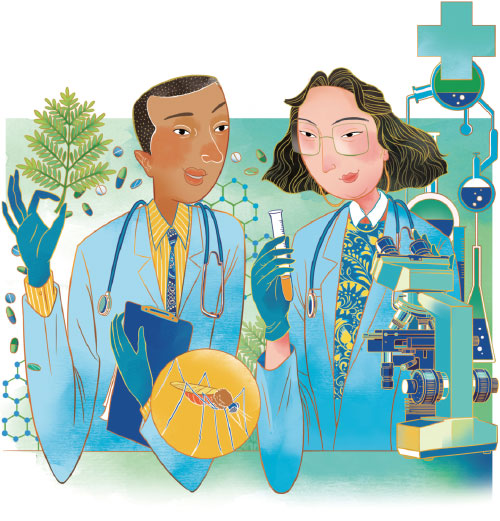Eradicating the once prevalent disease in the African country is one of the 60 cooperative projects with China that have helped bolster ties
Comoros, an African country located in the southwest Indian Ocean, is known as the Islands of the Moon. It is a mysterious country with beautiful natural scenery, where kind and hospitable people have created a profound culture. But malaria was a major public health problem in Comoros, causing huge losses and hindering local economic and social development.
However, the Chinese government, a good friend of Comoros, has provided assistance to improve public health in this country, and combating malaria is one of the 60 cooperation projects that the Chinese government has launched and supported in the country over the past 44 years.
China was the first country to recognize the independence of the Union of the Comoros, as the country is officially called. Since diplomatic ties were established on November 13, 1975, bilateral relations have developed smoothly, with expanding exchanges and increasing cooperation. The malaria project is a good example of this.
In Comoros, malaria was regarded as a demon bringing pain and torment. Fonad Muheji, former vice-president of Comoros, once mentioned that three members in his family suffered from malaria and had to go to hospital each month. Two to four people in every family were found infected with malaria. In 2006, malaria was detected in 108,000 of the 800,000 people in the country. In other words, 142 out of every 1,000 people had malaria.
In hospitals, malaria patients accounted for over 38 percent of outpatients and 60 percent of inpatients. Since 2004, anti-malaria experts from China have analyzed the previous anti-malaria efforts and innovated concepts and methods based on the actual situation in the islands, such as serious infection areas, and the life cycle and transmission characteristics of mosquitoes.
The experts then launched the anti-malaria project with medication combining artemisinin and piperaquine, which can flush out parasites and block the source of infection.
Initially, the Chinese experts encountered many difficulties, namely a lack of cooperation from the authorities and of understanding among residents.
However, they did not flinch.
The experts visited local governments to win their support, and put great effort into training and educating the population about malaria prevention and nationwide medication, using the media as a channel of communication. Posters and banners about malaria prevention can now be seen across the nation. This has helped generate a good atmosphere while motivating all parties.
"We conducted field research day and night, going to each household to publicize the knowledge about malaria prevention," said Deng Changsheng, one of the Chinese experts. "We also helped to set up special teams composed of local people to visit villages and persuade prestigious elders to support our work. Taking the Island of Moheli as an example, we visited its 27 villages, some of which even the president has perhaps not visited."
These efforts have won the support of the relevant authorities and people's trust in Comoros. It also dispelled doubts and worries of primary medical institutions. In November 2007, after more than two years of preparation, the anti-malaria project was introduced into the Island of Moheli. The then president of Comoros gave a speech and took the drug as a demonstration to others.
Such efforts were also promoted in the other islands, Anjouan and Grande Comore, in 2012 and 2013, respectively, achieving huge success. The infection of malaria was eliminated in Anjouan and the basic control has been realized in Grande Comore.
According to statistics, the antimalarial team has sent 200 people to Comoros, trained 236 personnel for malaria prevention and control and nearly 4,000 anti-malaria workers at village-level. By 2014, the country finally achieved zero deaths from malaria, with the number of people infected declining 98 percent and the new infection rate 0.28 percent.
"ZERO PALU, JE M'ENGAGE! (ZERO MALARIA, START FROM ME!)" This slogan has appeared frequently in the major news media and is popular among the public now.
The Chinese team is preparing for another round of island wide medication in Grande Comore from September to October. The anti-malaria campaign has lasted 12 years, proof that the Chinese plan finally won acceptance with its excellent results.
The anti-malaria project has grown into a highlight of cooperation between Comoros and China. Reported by the international media, its experience and approach have caught the attention of the world. The fruits of the project were reported by Clinical Infectious Diseases, a leading international journal of infectious diseases.
The nationwide medication of artemisinin combined with piperaquine was recorded by the World Health Organization. At present, the experience has been promoted in Sao Tome and Principe, Papua New Guinea, Kenya, Togo and Gambia.
In 2018, in order to help Comoros clear the remaining malaria sources on Grande Comore and fulfill the commitment of zero malaria to the Comoros government by 2021, the Chinese government again offered help by setting up an expert team for the project. It has been strongly supported by the Comoros government, which equipped it with local technical strength. The government also took the initiative to mobilize the public and enhanced exchanges with local residents. The project was also supported by the World Health Organization, which actively participated in the assessment at all stages during implementation, together with urging Comoros to establish and maintain an effective anti-malarial system.
Through the joint efforts of China, Comoros and international organizations, it is believed that zero malaria can become a reality in Comoros. And once the country shakes off the stigma of malaria, it can once again showcase its unique charms to the world.
The author is the Chinese ambassador to Comoros. The author contributed this article to China Watch, a think tank powered by China Daily. The views do not necessarily reflect those of China Daily.
中文翻译
科摩罗抗疟
帮助非洲国家根除疟疾是增强中非关系的60个合作项目之一。
科摩罗,又称为月亮之岛,是一个坐落于印度洋西南部的非洲国家。科摩罗是一个拥有美丽自然风光的神秘国度,友好且热情好客的当地居民在这里创造了深厚的文化。但是疟疾是科摩罗的公共健康问题,它造成了巨大的损失,也阻碍了当地经济和社会的发展。
然而,在过去的44年间,中国政府作为科摩罗的一个友好国家,开展了60个合作计划之一的抗疟项目,并提供了很多帮助去改善当地的公共卫生。当这个国家官方宣布称为科摩罗时,中国是第一个承认科摩罗联盟独立的国家。当两国在1975年11月13日建交时,双边关系便随着交易的扩大和合作的增加稳步发展,抗疟项目便是一个很好的例子。
在科摩罗,疟疾被认为是带来痛苦和折磨的恶魔。Fonad Muheji是科摩罗的前副总统,曾经提起他有三个家人感染疟疾,需要每个月到医院接受治疗。在科摩罗,每个家庭中就有2-4人被查出感染过疟疾。在2006年,这个国家的800,000人中,有108,000被检查出感染疟疾。换言之,每1000人中,就有142人感染过疟疾。
在医院收治疟疾病人中,门诊病人超过38%,住院病人为60%。自2004年以来,来自中国的抗疟专家分析了既往的的抗疟经历,根据当地岛屿的实际情况,例如在感染严重地区,蚊子的传播特点和生命周期,不断改进抗疟理念和方法。专家便实施了青蒿素联合哌喹抗疟治疗方案,这不仅可清除疟原虫,还可以阻断传染源。
在项目开始之际,中国专家们遇到了很多困难,例如当地政府部门的不合作和当地居民的不理解。但是,他们并没有因此而退缩。专家们走访政府部门以获得他们的支持,同时利用多媒体作为一个交流渠道,在训练和教育居民有关疟疾预防和全民服药治疗作出了巨大的努力。如今预防疟疾的海报和横幅已遍布科摩罗,这有助于调动各方抗疟积极性的同时营造良好的氛围。
中国专家邓长生说:“我们夜以继日地开展实地调查研究,走访每一个家庭,宣传有关疟疾的预防的知识。同时,我们也建立一支包含有当地居民的特殊队伍,走访村庄,劝说有声望的长老支持我们的工作。以Moheli岛为例,我们走访了27个村庄,其中有一些即使总统都还没有访问过的。”
这些努力已经赢得了当地有关部门和民众的支持,它也同样消除了初级医疗机构的怀疑和忧虑。在2007年11月,经过两年的准备,抗疟项目在Moheli岛正式实行。科摩罗的总统为此做了一个演讲,并当众服药作为演示。
在2012和2013年,类似的项目也分别在Anjouan岛和Grande Comore岛开展,都获得了巨大的成功。Anjouan岛成功消除疟疾,Grande Comore岛屿的疟疾控制也得以实现。据数据统计,抗疟队伍已经派遣了200个成员到科摩罗,训练了236名疟疾防控专业人员和4000名乡村抗疟工人。直到2014年,科摩罗最终达到疟疾零死亡率,人群感染率下降98%,新感染率0.28%。
ZERO PALU, JE M'ENGAGE! (消除疟疾,从我做起!)"这个标语经常出现在主流媒体中,并广泛在居民中流行。在9月到10月,中国抗疟团队准备在Grand Comore开始下一轮的全民服药计划。这项抗疟运动已经持续了12年,最终证实中国抗疟以出色的成绩得到认可。抗疟项目已经成为中国与科摩罗合作的重点。中国抗疟队伍的经验和方法已经引起了世界的注意,这个项目的成果曾被在国际领先的传染病杂志《Clinical Infectious Diseases》报道。
以青蒿素联合哌喹作为全民服药的方案,已经世界卫生组织所记载。目前,这个方案已经提倡在圣多美普林西比共和国、巴布亚新几内亚、肯尼亚、多哥和冈比亚国家实行。
在2018年,为了帮助科摩罗消除在Grand Comore的剩余疟疾传染源和在2021年帮助科摩罗政府达到零疟疾的目标,中国政府为此建立一个专业的队伍提供帮助。这个项目获得科摩罗政府的大力支持,当地政府还为此配置了当地的技术力量。政府还借此积极调动当地人民和加强居民之间的交流。这个项目还得到世界卫生组织的支持,他们积极参与到方案实施的各个环节的评估工作,促进科摩罗建立和维持有效的抗疟卫生系统。
通过中国、科摩罗政府和世界卫生组织的努力,在科摩罗实现零疟疾是可行的。当这个国家摆脱了疟疾的困扰,它就可以向世界展示它独特的魅力。

(China Daily Global 08/20/2019 page13)
http://www.chinadaily.com.cn/global/2019-08/20/content_37503410.htm










